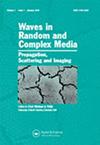Ultra-low radar cross-section realized by metasurface with nonuniform elements
3区 物理与天体物理
Q1 Engineering
引用次数: 0
Abstract
AbstractA novel checkerboard metasurface is proposed to realize broadband ultra-low radar cross-section reduction (RCSR). The metasurface element is a non-uniform array which contains two uniform subarrays composed of 3 × 6 metallic patches. The reflection phases of the two subarrays can be compensated each other. Based on this characteristic, the non-uniform element reflects two orthogonally polarized waves with a phase difference shrinking to 180 ± 20° in a wideband from 11.2 to 23.0 GHz. When the non-uniform elements are arranged into a checkerboard structure, two co-polarized reflective waves with phase difference of 180 ± 20° are then generated for arbitrary polarized incident waves, resulting in an ultra-low RCS reduction. Simulation results show that the proposed checkerboard metasurface achieves at least 15 dB RCS reduction from 11.2 to 23 GHz (69%) for normal incident waves. The experimental results are good agreement with the simulations.KEYWORDS: Metasurfaceultra-low RCSnonuniform elements Disclosure statementNo potential conflict of interest was reported by the author(s).Data availabilityDate underlying the results presented in this paper are not publicly available at this time but may be obtained from the authors upon reasonable request.Statement of noveltyThe metasurfaces have shown great application prospects in radar cross-section reduction (RCSR). Many metasurfaces have been successfully designed to obtain 10 dB RCSR. With the development of various radar technologies, however, the 10 dB RCSR can no longer meet the stealth requirements. Therefore, deeper and wider radar cross-section (RCS) reduction are always the main concerns of stealth technology. Based on this consideration, we present a checkerboard metasurface that can realize broadband 15 dB RCSR. The metasurface element is a non-uniform patches array, which is composed of two uniform subarrays of 3 × 6 metallic patches. The reflection phases of the two subarrays can be compensated each other, which makes the non-uniform element reflect two orthogonally polarized waves with a phase difference a lot closer to 180o (180 ± 20o) in a wideband. Then the phase cancelation mechanism is generated by orthogonally arranging the non-uniform element into a checkerboard structure, resulting in ultra-low RCS from 12.5–23.7 GHz. This work has potential application in the field of the stealthy platform.Additional informationFundingThis work was supported by National Natural Science Foundation of China [62361004, 62161002, 62161003]; Natural Science Foundation of Guangxi Province [2021GXNSFDA220003, 2020GXNSFAA297018]; Guangxi Key Laboratory of Precision Navigation Technology and Application, Guilin University of Electronic Technology [DH202223]; National Key Research and Development Program of China [2021YFA0715404, 2022YFE0134600].非均匀元超表面实现超低雷达截面
为了实现宽带超低雷达截面积抑制,提出了一种新型棋盘格元曲面。超表面元是一个非均匀阵列,它包含两个由3 × 6个金属块组成的均匀子阵列。两个子阵列的反射相位可以相互补偿。基于这一特性,非均匀元件在11.2 ~ 23.0 GHz的宽带范围内反射两个正交极化波,相位差缩小到180±20°。当非均匀元件排列成棋盘状结构时,对任意极化入射波产生两个相位差为180±20°的共极化反射波,从而实现超低RCS降低。仿真结果表明,所提出的棋盘格超表面在11.2 ~ 23 GHz范围内实现了至少15 dB的RCS降低(69%)。实验结果与仿真结果吻合较好。关键词:Metasurfaceultra-low rcnonuniform elements披露声明作者未报告潜在利益冲突。数据可得性本文所提供结果的数据目前尚未公开,但可根据合理要求从作者处获得。超表面在雷达截面积减小(RCSR)中具有广阔的应用前景。许多元表面已经被成功地设计为获得10 dB RCSR。然而,随着各种雷达技术的发展,10db RCSR已经不能满足隐身要求。因此,更深更宽的雷达截面积(RCS)减小一直是隐身技术的主要关注点。基于这一考虑,我们提出了一种可实现宽带15db RCSR的棋盘格元表面。超表面元是一个非均匀贴片阵列,由两个均匀的3 × 6金属贴片子阵列组成。两个子阵列的反射相位可以相互补偿,使得非均匀元件在宽带上反射两个相位差接近180度(180±200度)的正交极化波。然后将非均匀元件正交排列成棋盘状结构,产生相位抵消机制,从而获得12.5 ~ 23.7 GHz的超低RCS。该工作在隐身平台领域具有潜在的应用前景。基金资助:国家自然科学基金[62361004,62161002,62161003];广西自然科学基金[2021GXNSFDA220003, 2020GXNSFAA297018];桂林电子科技大学广西精密导航技术与应用重点实验室[DH202223];国家重点研发计划[2021YFA0715404, 2022YFE0134600]。
本文章由计算机程序翻译,如有差异,请以英文原文为准。
求助全文
约1分钟内获得全文
求助全文
来源期刊

Waves in Random and Complex Media
物理-物理:综合
自引率
0.00%
发文量
677
审稿时长
3.0 months
期刊介绍:
Waves in Random and Complex Media (formerly Waves in Random Media ) is a broad, interdisciplinary journal that reports theoretical, applied and experimental research related to any wave phenomena.
The field of wave phenomena is all-pervading, fast-moving and exciting; more and more, researchers are looking for a journal which addresses the understanding of wave-matter interactions in increasingly complex natural and engineered media. With its foundations in the scattering and propagation community, Waves in Random and Complex Media is becoming a key forum for research in both established fields such as imaging through turbulence, as well as emerging fields such as metamaterials.
The Journal is of interest to scientists and engineers working in the field of wave propagation, scattering and imaging in random or complex media. Papers on theoretical developments, experimental results and analytical/numerical studies are considered for publication, as are deterministic problems when also linked to random or complex media. Papers are expected to report original work, and must be comprehensible and of general interest to the broad community working with wave phenomena.
 求助内容:
求助内容: 应助结果提醒方式:
应助结果提醒方式:


